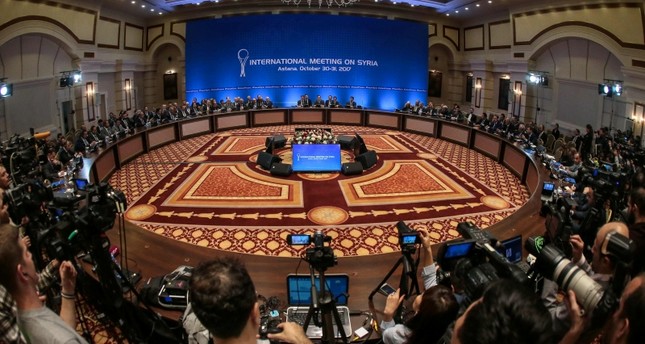Why are they implementing a military solution in Idleb now? And will these operations remain open-ended? And has Moscow lost its political patience with Turkey’s behavior?
The answer to this multifaceted question must be based on the following points:
First: It is recognized that the military escalation in northern Hama, Aleppo and Idleb came days after the end of the 12th round of Astana talks, which witnessed Iranian and Russian disappointment at Turkey’s behavior, despite it facing an internal setback, as well as the failure to pressure Turkey, which has not fulfilled its prior obligations and has obstructed the formation of a constitutional committee. This atmosphere was expressed clearly by the head of the Syrian delegation, Bashar al-Jaafari, who said: “The dilemma at the Astana meetings lies in the lack of seriousness by the Turkish side in implementing their commitments.”
Second: It was clear that the escalation was started by armed groups against Syrian regime positions and villages under government control and the Hemeimeem airbase two days before the beginning of the latest round in Astana, and Erdogan probably aimed to escape the pressure exerted on him in terms of the demands to implement his commitment to fight terrorist and stop the escalation, which the armed groups were carrying out, including Turkish messages in targeting Hemeimeem.
Third: The Syrian military operations, which have been able over one week to liberate more than 12 villages—that is, most of the northern Hama countryside, including vital military and economic points such as Qalaat al-Madiq—does not seem that it will be completed at the same pace for a number of reasons, most importantly preserving the lives of Syrian civilians in the areas occupied by armed militias, and not allowing them to be used at human shields or as a political bargaining chip in international forums. From my personal viewpoint, I think the military operations will be controlled and limited at the current time for political aims, which are as follows:
- Break the stalemate between the Astana tripartite and the regionally complex conditions in terms of conflicts and worrying, fragile balances.
- Change the map of the political understandings between the various influential actors, especially the Astana guarantors, coinciding with a development with which Moscow aims to expand the circle of the countries participating, whether to strengthen existing understandings or start new ones—especially given that the Syrian military operations will establish an appropriate atmosphere on the basis of expanded agreements around Idleb and its environs far from Turkish desires or Gulf-Saudi participation.
- The military operations in Idleb will echo in the eastern areas, especially as the Syrian army’s accumulating accomplishments will increase the tension and confusion among the Syrian Democratic Forces and the American occupying forces in light of the increasing popular pressure in the Syrian Jazira. This could steer Turkey towards two options: Either a likely settlement with Washington to establish a so-called safe zone or pushing its Olive Branch and Euphrates Shield militias to take vengeance towards Idleb and the eastern Euphrates.
This situation could be a pretext for a likely American or Israeli foreign intervention as a result of a number of factors which have scrambled the cards again:
- The accumulating accomplishments achieved by the Syrian Arab Army in the fourth de-escalation zone, which have been achieved in a short time period, with the armed groups collapsing at record speeds unexpected by their backers, which could push the countries hostile to Syria to use the chemical weapons or humanitarian pretext to justify their aggression to stop the Syrian march or to raise the militias’ moral. This would is what was threatened in the Washington Post a few days ago through a leak by a member of the US Congress. Adam Kinzinger had asked President Donald Trump to discipline the Russian and Syrian regimes.
- The Syrian-Iraqi cooperation in clearing the joint border in a way that has eliminated the terrorist outposts and then opened the border and broken the American siege, especially with the Iraqi side supplying Syria with fuel.
- Israeli annoyance about the S-300 rocket systems in Syria and the Israeli Prime Minister Benjamin Netanyahu failing after about a month to form a right-wing government and getting his first slap after starting his new term recently in Gaza.
The future of Idleb, which the achievements of Astana failed to penetrate, is being redrawn with fire in light of the lack of regional and international desire to resolve the Syrian crisis politically, at least at the current time. This military engineering has long pushed countries to acclimate with their results—and the examples of that are clear from southern Syria to the central area, passing through both Ghoutas.
This article was translated and edited by The Syrian Observer. Responsibility for the information and views set out in this article lies entirely with the author.


